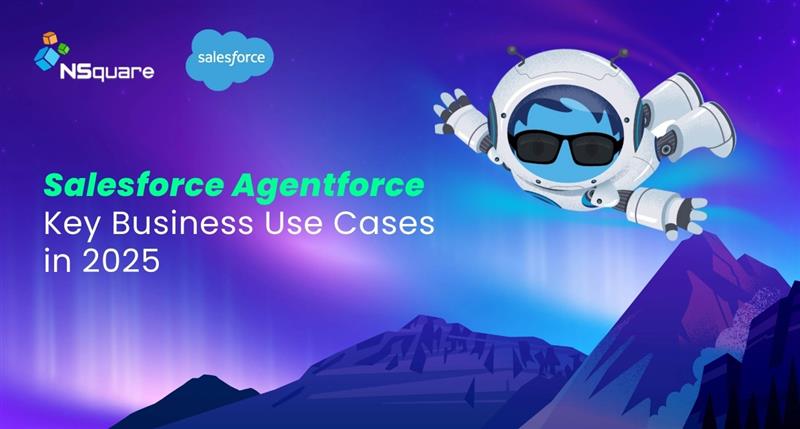
Artificial intelligence has evolved from being a buzzword to a business necessity, and Salesforce Agentforce is a prime example of how AI is transforming customer and employee experiences. Introduced as part of Salesforce’s Einstein 1 platform, Agentforce brings AI-powered virtual agents that can converse naturally, resolve requests, and automate complex workflows across industries.
In 2025, Agentforce is not just an add-on for Salesforce users; it has become the backbone of customer engagement strategies, helping organizations cut costs, increase productivity, and deliver highly personalized experiences.
This blog explores the key Salesforce Agentforce use cases that are shaping how companies work and interact with their customers in 2025.
Smarter Customer Support with AI-Powered Agents
Customer expectations are higher than ever. People want instant answers, 24/7 service, and personalized support without waiting in long queues. Agentforce delivers exactly that.
Always-on support
Unlike traditional support teams that operate within limited hours, Agentforce agents are available 24/7. Customers can get help at midnight the same way they would during business hours.
High-volume query handling
Businesses in retail, telecom, and travel face thousands of repetitive requests every day. Agentforce can automatically resolve FAQs like password resets, shipping updates, or subscription changes, freeing up human agents for complex issues.
Smarter escalation
If a query requires human intervention, Agentforce hands over the case with full context, ensuring the customer doesn’t repeat themselves.
Salesforce reports that companies using AI agents have seen up to a 30% drop in average response time and 20–25% higher customer satisfaction scores.
Personalized Sales Assistance
Sales teams thrive on relationships, but they often lose time in manual research—digging through CRM data, preparing proposals, and chasing the wrong leads. Agentforce changes the game.
AI-driven recommendations
Based on customer history, preferences, and behavioral data, Agentforce suggests the next best step, whether it’s sending a product demo, offering a discount, or scheduling a call.
Real-time deal coaching
While interacting with a client, sales reps can ask Agentforce questions like “What products has this customer purchased in the last year?” or “What objections have they raised before?” and get instant answers.
Personalized communication
Agentforce can draft customized follow-up emails or proposals, ensuring consistency while saving time.
A recent industry survey revealed that 64% of sales reps using AI tools closed deals faster than those relying only on manual processes.
Boosting Employee Productivity Through Workflow Automation
Agentforce isn’t limited to customer-facing use cases. It also plays a key role in making employees more efficient by automating everyday internal processes.
HR and employee support
New hires can interact with an AI agent for onboarding tasks, accessing policies, requesting equipment, or setting up IT accounts without waiting for HR teams.
Finance and procurement
Employees can use Agentforce to check budget balances, submit expense reports, or track invoice approvals instantly.
Collaboration and task management
Instead of digging through multiple systems, workers can simply ask Agentforce for project status updates or upcoming deadlines.
This AI assistant for employees reduces time wasted on repetitive tasks and enables staff to focus on innovation and strategy.
Real-Time Data Insights for Faster Decision-Making
Data is often described as the new oil, but raw data is useless without context. Agentforce simplifies decision-making by making Salesforce data conversational and actionable.
- Natural language queries: Executives don’t need to run complex reports. They can simply ask Agentforce, What were our top 5 selling products in Q2? and receive a clear, visual answer.
- Predictive forecasting: Agentforce can analyze historical patterns and generate forecasts for revenue, customer churn, or service demand.
- Scenario modeling: Business leaders can explore what-if scenarios, such as What happens if we increase discounts in Region A by 10%?
By making analytics accessible to everyone, not just data teams. Agentforce empowers organizations to be more agile in their strategy.
Industry-Specific Use Cases
While the above applications are cross-industry, Agentforce shines even brighter in specialized verticals:
Healthcare
Virtual agents can manage appointment scheduling, send reminders for medications, and provide post-care follow-ups, reducing patient no-shows.
Retail and eCommerce
AI agents recommend products, handle order modifications, and streamline returns boosting customer loyalty.
Banking & Financial Services
Agentforce provides account assistance, detects fraud patterns, and guides customers through complex loan processes.
Manufacturing
From supplier coordination to predictive machine maintenance, Agentforce ensures smoother operations and supply chain resilience.
This industry focus makes Agentforce adaptable to unique challenges while still being scalable across global enterprises.
Why Agentforce Matters in 2025
The significance of Agentforce in 2025 goes beyond automation; it’s about reshaping how humans and AI collaborate. Businesses adopting it strategically are reporting benefits like:
- Cost efficiency: Reduced dependency on large support teams.
- Customer loyalty: Consistently fast, personalized service.
- Employee satisfaction: Less administrative burden, more strategic focus.
- Business agility: Faster access to insights and decision-making.
In short, Agentforce represents the future of AI-driven engagement, making organizations more resilient, responsive, and ready for growth.
Conclusion
Salesforce Agentforce is no longer just an innovation on the horizon; it’s the technology steering organizations in 2025. From smarter customer service to AI-assisted sales, proactive field operations, and enterprise-wide automation, its use cases are setting new benchmarks across industries.
Companies that embrace Agentforce today are not just improving efficiency; they are building future-ready ecosystems where every interaction is intelligent, personalized, and impactful.
